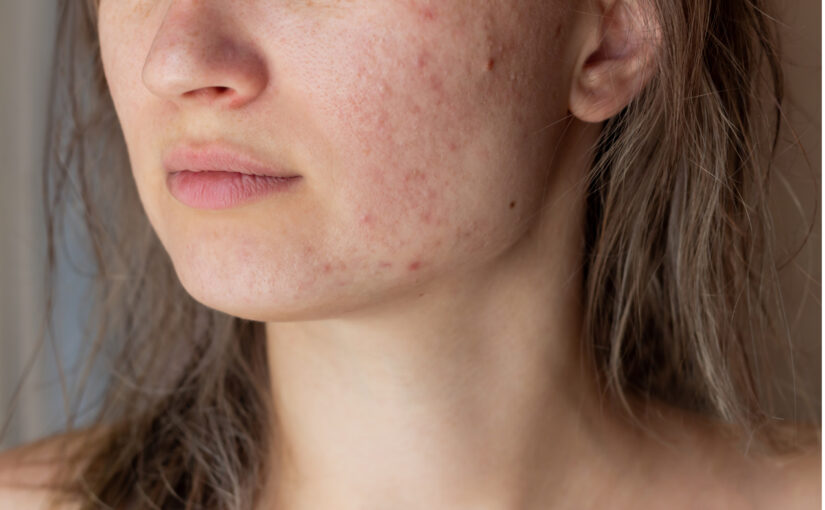
Acne is a common skin condition that affects millions of people worldwide with the appearance of pimples, blackheads, and whiteheads on the face, neck, chest, and back. While many factors contribute to the development of acne, such as hormones, genetics, and lifestyle, there is one cause that often goes overlooked: inflammation of the gut.
The gut is home to trillions of bacteria, collectively known as the gut microbiome. These bacteria play an essential role in digestion, immunity, and overall health. However, when the gut microbiome becomes imbalanced due to poor diet, stress, or medications, inflammation can occur, leading to a range of health problems, including acne.
How does gut inflammation cause acne?
The link between gut health and skin health has been recognized for centuries. In traditional Chinese medicine, practitioners have long believed that imbalances in the gut can manifest on the skin. Modern research supports this view, with studies showing that gut inflammation can disrupt the balance of hormones and immune system function, both of which are closely linked to the development of acne.
When the gut is inflamed, it can lead to the release of pro-inflammatory molecules that enter the bloodstream and trigger an immune response. These molecules can travel to the skin and cause inflammation, which can contribute to the formation of acne. Additionally, gut inflammation can increase the production of sebum, which is an oily substance that can clog pores and lead to the development of acne.
A study titled “Potential Role of the Microbiome in Acne: A Comprehensive Review” explores the link between gut microbiome health and skin health, particularly in relation to the development of acne. The study found that imbalances in the gut bacteria can lead to inflammation in the skin and, subsequently, the development of acne. It was also found that certain strains of bacteria, such as Propionibacterium acnes, have a beneficial effect on skin health and can reduce the severity of acne. The study highlights the importance of maintaining a healthy gut microbiome through diet and lifestyle choices in order to improve skin health and reduce the risk of developing acne.
Maintaining a healthy gut is essential for overall health. Here are some ways that a healthy gut can reflect healthy skin.
- Reduced inflammation: By promoting a healthy balance of bacteria in the gut, you can reduce inflammation throughout the body, including in the skin.
- Improved hormone balance: Hormone imbalances, particularly an excess of androgens, can contribute to acne. A healthy gut can help balance hormones and reduce the risk of acne.
- Enhanced immune function: A healthy gut microbiome can support a stronger immune system, promoting healthier skin and reducing the risk of infection.
- Increased nutrient absorption: A healthy gut can absorb the nutrients needed for healthy skin, including vitamins A, C, E, zinc, and selenium.
So, what can you do to support a healthy gut and clear, healthy skin?
- Eat a healthy diet: A diet high in fiber, fruits, and vegetables can support a healthy gut microbiome.
- Avoid processed foods, sugary drinks, and saturated fats, which can promote inflammation and disrupt gut health.
- Take probiotics: Probiotics are live bacteria that can help restore the balance of bacteria in the gut. They can be found in fermented foods like yogurt, kefir, and sauerkraut, or taken as a supplement.
- Manage stress: Stress can disrupt gut health and contribute to the development of acne. Engage in stress-reducing activities like yoga, meditation, or deep breathing exercises.
- Exercise regularly: Regular exercise can help promote gut health and reduce inflammation throughout the body.
- Eat fermented foods: Fermented foods like kefir, kimchi, sauerkraut, and yogurt contain live bacteria that can support gut health.
- Consume prebiotic foods: Prebiotics are foods that serve as food for the healthy bacteria in the gut. Some examples of prebiotic foods include onions, garlic, asparagus, and bananas.
- Avoid antibiotics: Antibiotics can disrupt the balance of bacteria in the gut, leading to inflammation and other health problems.
- Stay hydrated: Drinking enough water can help flush out toxins and support digestion, which can promote a healthy gut.
- Remember, achieving a healthy gut takes time and effort. By making small changes to your diet and lifestyle, you can promote gut health and enjoy clearer, healthier skin.
Over all, while acne can have many causes, inflammation of the gut is often overlooked as a major contributor. By supporting a healthy gut through diet, probiotics, stress management, and exercise, you can not only achieve better overall health but also clearer, healthier skin. So, take care of your gut, and your skin will thank you!
References:
Potential Role of the Microbiome in Acne: A Comprehensive Review
The role of gut microbiome in inflammatory skin disorders: A systematic review
Disclaimer: The information provided in this article is for educational purposes only and is not a substitute for medical advice. Always consult a healthcare professional before making changes to your diet or lifestyle.


